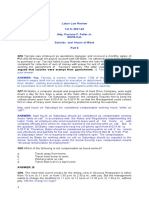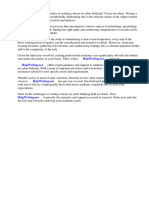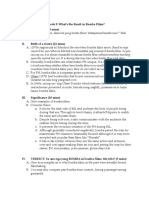58%(12)58% found this document useful (12 votes)
5K viewsRaw Transcription
Raw Transcription
Uploaded by
Brigette DomingoThe document discusses Abeba Berhane, a PhD student at University College Dublin who is currently in New York for the AAAI conference. It provides background on how Abeba became interested in AI ethics through her studies in embodied cognitive science. Abeba realized that technology impacts people unequally depending on their privileges. This led her to focus on the ethics of AI and develop the concept of "relational ethics," which centers the perspectives of those most impacted by technology rather than just focusing on mathematical formulations of fairness.
Copyright:
© All Rights Reserved
Available Formats
Download as DOCX, PDF, TXT or read online from Scribd
Raw Transcription
Raw Transcription
Uploaded by
Brigette Domingo58%(12)58% found this document useful (12 votes)
5K views2 pagesThe document discusses Abeba Berhane, a PhD student at University College Dublin who is currently in New York for the AAAI conference. It provides background on how Abeba became interested in AI ethics through her studies in embodied cognitive science. Abeba realized that technology impacts people unequally depending on their privileges. This led her to focus on the ethics of AI and develop the concept of "relational ethics," which centers the perspectives of those most impacted by technology rather than just focusing on mathematical formulations of fairness.
Original Description:
adsdadas
Copyright
© © All Rights Reserved
Available Formats
DOCX, PDF, TXT or read online from Scribd
Share this document
Did you find this document useful?
Is this content inappropriate?
The document discusses Abeba Berhane, a PhD student at University College Dublin who is currently in New York for the AAAI conference. It provides background on how Abeba became interested in AI ethics through her studies in embodied cognitive science. Abeba realized that technology impacts people unequally depending on their privileges. This led her to focus on the ethics of AI and develop the concept of "relational ethics," which centers the perspectives of those most impacted by technology rather than just focusing on mathematical formulations of fairness.
Copyright:
© All Rights Reserved
Available Formats
Download as DOCX, PDF, TXT or read online from Scribd
Download as docx, pdf, or txt
58%(12)58% found this document useful (12 votes)
5K views2 pagesRaw Transcription
Raw Transcription
Uploaded by
Brigette DomingoThe document discusses Abeba Berhane, a PhD student at University College Dublin who is currently in New York for the AAAI conference. It provides background on how Abeba became interested in AI ethics through her studies in embodied cognitive science. Abeba realized that technology impacts people unequally depending on their privileges. This led her to focus on the ethics of AI and develop the concept of "relational ethics," which centers the perspectives of those most impacted by technology rather than just focusing on mathematical formulations of fairness.
Copyright:
© All Rights Reserved
Available Formats
Download as DOCX, PDF, TXT or read online from Scribd
Download as docx, pdf, or txt
You are on page 1of 2
Raw transcription by Brigette L.
Domingo
Duration: 35 minutes
[00:00:00.282] - Sam Charrington
All right everyone. I am on the line with Abeba Berhane. Abeba is a Ph.D. student at University
College Dublin. Abeba, welcome to the TWIML AI podcast.
[00:00:12.552] - Abeba Berhane
Thank you so much for having me, Sam.
[00:00:15.522] - Sam Charrington
I'm really excited about this conversation. We had an opportunity to meet in person after a long
while interacting on Twitter at the most recent NeurIPs conference, in particular the Black in AI
Workshop, where you not only presented your paper Algorithmic Injustices Toward Relational
Ethics, but you won best paper there. And so I'm looking forward to digging into that and some
other topics. But before we do that, I would love to hear you kind of share a little bit about your
background. And I will mention for folks that are hearing the sirens in the background, while I
mentioned that you are from University College Dublin, you happen to be in New York now at
the A. I. E. S. Conference in association with AAAI. And as folks might know, it's hard to avoid
sirens and construction in New York City. So just consider that background. Our mood, mood,
ambience, background sounds so, your background.
[00:01:24.982] - Abeba Berhane
Yes, yes.
[00:01:25.942] - Sam Charrington
How did you get started working in AI Ethics?
[00:01:28.482] - Abeba Berhane
So my background is in cognitive science and particularly and a part of cognitive science called
Embodied Cognitive Science, which is which has the roots, you know, in cybernetics, in systems
thinking. The idea is to focus on on on the on the social and the cultural, on the historical and
kind of to view cognition in continuity with the world, with historical backgrounds and all that
and as opposed to, you know, your your traditional approach to cognition, which just creates
cognition as something located in the brain or something formalizable, something that can be
computed. So, yes. So that is my background. Even during my masters, I. I lean towards the A.I.
side of cognitive science. The more I delve into it, the more I am much more attracted to to the
ethics side, to, you know, injustices, to the social issues. And so the more the Ph.D. Goes on, the
more I find myself in the ethics side.
[00:02:49.942] - Sam Charrington
Was there a particular point that you realized that you were really excited about the ethics part
in particular, or did it just evolve for you?
[00:02:59.212] - Abeba Berhane
I think it just evolved. So when I started out, I at the end of my Masters and at the start of the
Ph.D., my idea is that, you know, we have this new relatively new school way of thinking, which
Raw transcription by Brigette L. Domingo
Duration: 35 minutes
is Embodied CogSci, which I quite like very much because it emphasizes, you know, ambiguities
in messiness and contingencies as opposed to, you know, drawing clean boundaries. And so the
idea is, yes, I like the idea of redefining cognition as something relational, something inherently
social, and something that is continually impacted, influenced by other people and the
technologies we use. So the technology aspect, the technology end was my interest. So initially,
the idea is, yes, technology is constitutes aspect of aspect of our cognition. You have the
famous 1998 thesis by Andy Clark and Dave Chalmers, the extended mind where they claimed,
you know, the iPhone is an extension of your mind. And so you can think of it that way. And I
was kind of advancing the same line of thought. But the more I delved into it, the more I saw
yes, digital technology, whether it's, you know, ubiquitous computing, such as face recognition
systems on the street or your phone, whatever. Yes. It does impact and it does continually
shape and reshape our cognition in what it means to exist in the world. But what became more
and more clear to me is that not everybody is impacted equally. And the more privileged you
are, the the the more in control of you are as to, you know, what can influence you and what
you can avoid. So that's where I become more and more involved with the ethics of
computation and its its impact on cognition.
[00:05:23.422] - Sam Charrington
The notion of privilege is something that flows throughout the work that you presented at Black
in A.I., the Algorithmic Injustices paper, and this idea, this construct of relational ethics. What is
relational ethics and what are you getting at with it?
[00:05:45.202] - Abeba Berhane
Yeah, so relational ethics is actually not a new thing. A lot of people have theorized about it and
have written about it. But the way I'm approaching it is the way I'm using it is and it's I guess it
kind of springs from and this frustration that for many folk who talk about ethics or fairness or
justice, most of it comes down to, you know, constructing this neat formulation of fairness or a
mathematical calculation of who should be included and who should be excluded. What kind of
data do we need, that sort of stuff. So for me, relational ethics is kind of let's leave that for a
little bit and let's zoom out and see the bigger picture. And instead of using technology to solve
the problems that emerged from technology itself. So which which means censoring
technology, let's instead center the people that are people, especially people that are
disproportionally impacted by, you know, the limitations or the problems that arise with the
development and implementation of technology. So there is a robust research in you can
quantify fairness or algorithmic injustice. And the pattern is that the more you are at the at the
bottom of the intersection level, that means the farther away from you are from your
stereotypical white CIS gendered domain and the more the bigger the negative impacts on you,
whether it's classification or categorization or whether it's being scanned and called for and by
hiring algorithms. Or looking for housing or anything like that. The more you move away from
that stereotypical category, you know, the status quo, the more the heavy the impact is on you.
So the idea of relationality is kind of to to to think from that perspective to to take that as a
starting point. So these are the groups or these are the.
You might also like
- Revised TranscriptionDocument3 pagesRevised TranscriptionBrigette Domingo72% (32)
- 2021.02.24 Gette Final TrialDocument19 pages2021.02.24 Gette Final TrialBrigette DomingoNo ratings yet
- TRIAL - TWIML (Artificial Intelligence) Interview With Abeba Birhane.m4a - enDocument2 pagesTRIAL - TWIML (Artificial Intelligence) Interview With Abeba Birhane.m4a - enNimref Kcin67% (3)
- AI Intelligence (Sam Charrington and Abeba Birhane)Document2 pagesAI Intelligence (Sam Charrington and Abeba Birhane)Ethel Shammah Waoulda Acleta90% (10)
- Race After Technology - Abolitio - Ruha BenjaminDocument168 pagesRace After Technology - Abolitio - Ruha BenjaminRaniê Solarevisky95% (19)
- Transcribed VerbatimDocument3 pagesTranscribed VerbatimXerin JC100% (3)
- Transcription AbebaDocument1 pageTranscription AbebaLucel Lapiña50% (2)
- Jennifer Larson RAWDocument12 pagesJennifer Larson RAWkyb799grrnNo ratings yet
- TWIML - PODCAST - First NotesDocument3 pagesTWIML - PODCAST - First NotesKhim DV100% (2)
- TRIAL - TWIML (Artificial Intelligence) Interview With Abeba Birhane - 202309181109Document3 pagesTRIAL - TWIML (Artificial Intelligence) Interview With Abeba Birhane - 202309181109Veronica Yvonne San Diego0% (1)
- Transcript #1Document2 pagesTranscript #1Ma. CarlosNo ratings yet
- Evidence of A Master ConspiracyDocument98 pagesEvidence of A Master ConspiracyHal Shurtleff100% (2)
- How To Exit The MatrixDocument33 pagesHow To Exit The Matrixannette133783% (6)
- Ep. 17 - Data - AnalystDocument2 pagesEp. 17 - Data - AnalystBrigette DomingoNo ratings yet
- The Next Story: Faith, Friends, Family, and the Digital WorldFrom EverandThe Next Story: Faith, Friends, Family, and the Digital WorldRating: 4 out of 5 stars4/5 (37)
- Bar Q Salaries Part 2Document5 pagesBar Q Salaries Part 2Brigette DomingoNo ratings yet
- Statics of Rigid Bodies ChaptersDocument34 pagesStatics of Rigid Bodies ChaptersDeniell Kahlil Kyro Gabon100% (1)
- TRIAL TWIML (Artificial Intelligence) Interview With Abeba Birhane.m4aDocument2 pagesTRIAL TWIML (Artificial Intelligence) Interview With Abeba Birhane.m4aaaronvalencia2728No ratings yet
- AI & Humanity Archive - Adrian WellerDocument14 pagesAI & Humanity Archive - Adrian WellerAndrew CarnegieNo ratings yet
- 053 - Is Seeing Believing? Deepfakes and The Information Apocalypse - TRANSCRIPTDocument11 pages053 - Is Seeing Believing? Deepfakes and The Information Apocalypse - TRANSCRIPTNemattullah RahimiNo ratings yet
- Week 2 Lecture TranscriptDocument7 pagesWeek 2 Lecture TranscriptDana MakhoulNo ratings yet
- 053 - Is Seeing Believing? Deepfakes and The Information ApocalypseDocument10 pages053 - Is Seeing Believing? Deepfakes and The Information ApocalypseMita TasmayantiNo ratings yet
- Digital Inferno: Using Technology Consciously in Your Life and Work, 101 Ways to Survive and Thrive in a Hyperconnected WorldFrom EverandDigital Inferno: Using Technology Consciously in Your Life and Work, 101 Ways to Survive and Thrive in a Hyperconnected WorldNo ratings yet
- (273-107) MEDIA 102 T11C - Tue 06 Aug 04 - 00 PM (NZT) - Captions - English (United Kingdom)Document20 pages(273-107) MEDIA 102 T11C - Tue 06 Aug 04 - 00 PM (NZT) - Captions - English (United Kingdom)evanrooney2004No ratings yet
- Stephen Wolfram ThesisDocument7 pagesStephen Wolfram Thesisjenwilliamsneworleans100% (2)
- Interview Transcript - David DanksDocument11 pagesInterview Transcript - David DanksJoon JangNo ratings yet
- Wave OH Nick Land en ArchiveDocument14 pagesWave OH Nick Land en ArchiveLucifugus ReficulNo ratings yet
- Buy ebook Big Data's Threat to Liberty: Surveillance, Nudging, and the Curation of Information 1st Edition Henrik Skaug Saetra cheap priceDocument41 pagesBuy ebook Big Data's Threat to Liberty: Surveillance, Nudging, and the Curation of Information 1st Edition Henrik Skaug Saetra cheap pricevenaalicja100% (2)
- Interview Transcript - Barbara GroszDocument8 pagesInterview Transcript - Barbara GroszJoon JangNo ratings yet
- The Cyber Effect: An Expert in Cyberpsychology Explains How Technology Is Shaping Our Children, Our Behavior, and Our Values--and What We Can Do About ItFrom EverandThe Cyber Effect: An Expert in Cyberpsychology Explains How Technology Is Shaping Our Children, Our Behavior, and Our Values--and What We Can Do About ItRating: 3.5 out of 5 stars3.5/5 (11)
- Julia Taylor Kennedy et al.’s “Big Data, Virginia Woolf, and the Right to be Forgotten”Document16 pagesJulia Taylor Kennedy et al.’s “Big Data, Virginia Woolf, and the Right to be Forgotten”heyitslola007No ratings yet
- Cybercognition - Lee HadlingtonDocument285 pagesCybercognition - Lee HadlingtonRamona VintilaNo ratings yet
- CCDocument1 pageCCSankrit RanaNo ratings yet
- Our Core ValuesDocument7 pagesOur Core ValuesSaravana RajNo ratings yet
- Dark Side of The InternetDocument273 pagesDark Side of The InternetMuntasir HashimNo ratings yet
- Exploring The Philosophical Terrain of The Digital DivideDocument16 pagesExploring The Philosophical Terrain of The Digital Dividesurajkumar007No ratings yet
- Cyber Bullying Thesis TopicsDocument5 pagesCyber Bullying Thesis Topicstashahollowaylittlerock100% (2)
- Cyber Ethics IssuesDocument8 pagesCyber Ethics IssuesThanmiso LongzaNo ratings yet
- Easy Ways to Be More Private on the Internet (Second Edition)From EverandEasy Ways to Be More Private on the Internet (Second Edition)No ratings yet
- 1nc Shirley Dubs ActualDocument32 pages1nc Shirley Dubs ActualDavidRooneyNo ratings yet
- Shame Nation: The Global Epidemic of Online HateFrom EverandShame Nation: The Global Epidemic of Online HateRating: 4 out of 5 stars4/5 (7)
- The Digital Challenge: On how we live and cope with digital dangersFrom EverandThe Digital Challenge: On how we live and cope with digital dangersNo ratings yet
- Winning With Technologies, LLC: Book One "Making Friends With Technology"From EverandWinning With Technologies, LLC: Book One "Making Friends With Technology"No ratings yet
- Thesis Using Participant ObservationDocument6 pagesThesis Using Participant Observationlizbrowncapecoral100% (1)
- We're Living in Disruptive TimesDocument4 pagesWe're Living in Disruptive TimesMartijn AslanderNo ratings yet
- Sman 4 MKSDocument3 pagesSman 4 MKS34.Zulfadli Achmad RamadhanNo ratings yet
- Did God Create the Internet?: The Impact of Technology on HumanityFrom EverandDid God Create the Internet?: The Impact of Technology on HumanityNo ratings yet
- High School Essay SamplesDocument7 pagesHigh School Essay Samplesafibyoabyfffry100% (2)
- The Creation and Inheritance of Digital Afterlives: You Only Live Twice 1st Edition Debra J. Bassett 2024 Scribd DownloadDocument49 pagesThe Creation and Inheritance of Digital Afterlives: You Only Live Twice 1st Edition Debra J. Bassett 2024 Scribd Downloadjadsomkuekeu100% (5)
- Immediate download The Psychology of Silicon Valley Ethical Threats and Emotional Unintelligence in the Tech Industry Katy Cook ebooks 2024Document55 pagesImmediate download The Psychology of Silicon Valley Ethical Threats and Emotional Unintelligence in the Tech Industry Katy Cook ebooks 2024nichoabuhl0aNo ratings yet
- Group 2 Sts Namin ToDocument5 pagesGroup 2 Sts Namin Towynlovesyou0% (1)
- Where can buy Advances in Deep Learning, Artificial Intelligence and Robotics: Proceedings of the 2nd International Conference on Deep Learning, Artificial ... 2020 (Lecture Notes in Networks and Systems) Luigi Troiano (Editor) ebook with cheap priceDocument25 pagesWhere can buy Advances in Deep Learning, Artificial Intelligence and Robotics: Proceedings of the 2nd International Conference on Deep Learning, Artificial ... 2020 (Lecture Notes in Networks and Systems) Luigi Troiano (Editor) ebook with cheap pricelidyslacsnyNo ratings yet
- Moral IssuesDocument9 pagesMoral IssuesCharles RomanoNo ratings yet
- Lecture 1 Week 2Document3 pagesLecture 1 Week 2himanshu.jasshuNo ratings yet
- Virtual Communities - Exchanging Ideas Through Computer Bulletin BoardsDocument5 pagesVirtual Communities - Exchanging Ideas Through Computer Bulletin BoardsAmin OvidusNo ratings yet
- Transcript 1Document7 pagesTranscript 1HANA ZANE AGUSTINNo ratings yet
- Ethics and Software DevelopmentDocument8 pagesEthics and Software DevelopmentJohn Steven Anaya InfantesNo ratings yet
- Internet Has Done More Harm Than Good in The SocietyDocument2 pagesInternet Has Done More Harm Than Good in The SocietyShashwatNo ratings yet
- (Routledge Studies in Contemporary Philosophy) Alberto Romele - Digital Habitus. A Critique of The Imaginaries of Artificial Intelligence-Routledge. Taylor & Francis Group (2024)Document185 pages(Routledge Studies in Contemporary Philosophy) Alberto Romele - Digital Habitus. A Critique of The Imaginaries of Artificial Intelligence-Routledge. Taylor & Francis Group (2024)Miguel Angel Cid PedrerosNo ratings yet
- 1.2.1 Managing Knowledge in The Age of Digitalization-EnDocument3 pages1.2.1 Managing Knowledge in The Age of Digitalization-EnMBNo ratings yet
- Why This Document?Document20 pagesWhy This Document?mayankbindassNo ratings yet
- De Grano Christine Doctrines Preliminary AttachmentDocument1 pageDe Grano Christine Doctrines Preliminary AttachmentBrigette DomingoNo ratings yet
- Sapiosexual: I. Intro (3 Mins) II. Concept/Technicalities (5 Mins)Document1 pageSapiosexual: I. Intro (3 Mins) II. Concept/Technicalities (5 Mins)Brigette DomingoNo ratings yet
- Stag Notes 2021 Capuno TopicsDocument22 pagesStag Notes 2021 Capuno TopicsBrigette Domingo100% (3)
- Midterms 2022 QuestionsDocument4 pagesMidterms 2022 QuestionsBrigette DomingoNo ratings yet
- Cancel Culture: I. Intro (3 Mins) II. in A Nustshell (10 Mins)Document2 pagesCancel Culture: I. Intro (3 Mins) II. in A Nustshell (10 Mins)Brigette DomingoNo ratings yet
- Hung About . Don't Look Up (Movie Review) : Self-Introduction (3-5 Mins)Document2 pagesHung About . Don't Look Up (Movie Review) : Self-Introduction (3-5 Mins)Brigette DomingoNo ratings yet
- Episode 10: Aesthetics v. Substance: Film Edition I. Introduction (3 Mins)Document1 pageEpisode 10: Aesthetics v. Substance: Film Edition I. Introduction (3 Mins)Brigette DomingoNo ratings yet
- Episode 11: The Attitude and Ruthless Aggression of WrestlingDocument2 pagesEpisode 11: The Attitude and Ruthless Aggression of WrestlingBrigette DomingoNo ratings yet
- Episode 9: What's The Bomb in Bomba Films? I. Introduction (3 Mins)Document1 pageEpisode 9: What's The Bomb in Bomba Films? I. Introduction (3 Mins)Brigette DomingoNo ratings yet
- Taxation Law ReviewDocument2 pagesTaxation Law ReviewBrigette DomingoNo ratings yet
- Civil Law Review 2 Case DigestsDocument10 pagesCivil Law Review 2 Case DigestsBrigette DomingoNo ratings yet
- HOMEWORK NO. 3 Asynchronous Baste Civ Law Review 2Document4 pagesHOMEWORK NO. 3 Asynchronous Baste Civ Law Review 2Brigette DomingoNo ratings yet
- Episode 7: Drunk Stories I. Introduction (3 Mins) : Dito. Try Describing Your OWN Drunk Stories Like "Drunk Stories KoDocument2 pagesEpisode 7: Drunk Stories I. Introduction (3 Mins) : Dito. Try Describing Your OWN Drunk Stories Like "Drunk Stories KoBrigette DomingoNo ratings yet
- Republic of The Philippines Department of Justice Office of The City Prosecutor Quezon City Aiko Presbitero Raymart Ardales Y CasasDocument2 pagesRepublic of The Philippines Department of Justice Office of The City Prosecutor Quezon City Aiko Presbitero Raymart Ardales Y CasasBrigette Domingo100% (2)
- Lana - Provisional Remedies Case DigestsDocument3 pagesLana - Provisional Remedies Case DigestsBrigette DomingoNo ratings yet
- HOMEWORK NO. 2 Baste Civ Law Review 2Document4 pagesHOMEWORK NO. 2 Baste Civ Law Review 2Brigette DomingoNo ratings yet
- Case Doctrines BumacodDocument2 pagesCase Doctrines BumacodBrigette DomingoNo ratings yet
- Level 1 Certification - ApplicationDocument1 pageLevel 1 Certification - ApplicationBrigette DomingoNo ratings yet
- Ibanez Case DoctrinesDocument1 pageIbanez Case DoctrinesBrigette DomingoNo ratings yet
- Manuel Reyes v. Hon. Leonor Ines-Luciano, GR No. L-48219, 28 February 1979Document2 pagesManuel Reyes v. Hon. Leonor Ines-Luciano, GR No. L-48219, 28 February 1979Brigette DomingoNo ratings yet
- Criminal Procedure I SISON With NOTES and CASESDocument28 pagesCriminal Procedure I SISON With NOTES and CASESBrigette DomingoNo ratings yet
- Reservoir Compaction and Seafloor Subsidence at ValhallDocument10 pagesReservoir Compaction and Seafloor Subsidence at ValhallIgnasi AliguerNo ratings yet
- Research Article: Progress and Performance of Oyo Rooms-A Research Based Case StudyDocument6 pagesResearch Article: Progress and Performance of Oyo Rooms-A Research Based Case StudyRuchika JainNo ratings yet
- Elder Evils MonstersDocument31 pagesElder Evils MonstersJon GilliamNo ratings yet
- Physics Project On CapacitorsDocument16 pagesPhysics Project On CapacitorsIraban GuptaBasuNo ratings yet
- Math Reflective Writing - Mortgage LabDocument4 pagesMath Reflective Writing - Mortgage LabJacob AndersonNo ratings yet
- Suman Kumar: Career ObjectiveDocument3 pagesSuman Kumar: Career ObjectiveSuman AgarwalNo ratings yet
- Use and Abuse of Springs To Model Bridge FoundationsDocument124 pagesUse and Abuse of Springs To Model Bridge FoundationsRigid JointNo ratings yet
- Udvartana (Ayurveda Powder Massage) : A Review ArticleDocument4 pagesUdvartana (Ayurveda Powder Massage) : A Review ArticleAnonymous izrFWiQ100% (1)
- Cn5131 OutlineDocument6 pagesCn5131 OutlineAki EspaldonNo ratings yet
- SITXFSA004 Assessment 1 AssignmentDocument11 pagesSITXFSA004 Assessment 1 AssignmentkarthikNo ratings yet
- Alphabetic List of TheoriesDocument9 pagesAlphabetic List of TheoriesTahira SafdarNo ratings yet
- Formula SheetDocument1 pageFormula SheetHabeba EmadNo ratings yet
- AVID MC Windows CPU Specifications 2022.12A-1Document15 pagesAVID MC Windows CPU Specifications 2022.12A-1Will LawsonNo ratings yet
- Technical Tracker Specification: Project: CustomerDocument31 pagesTechnical Tracker Specification: Project: CustomerormatioliNo ratings yet
- CadburyDocument33 pagesCadburyVarun JainNo ratings yet
- HomeLYnk Remote ServicesDocument2 pagesHomeLYnk Remote ServicesVictor Raul Iturrieta MadridNo ratings yet
- Installation Guide For Cisco ACSDocument8 pagesInstallation Guide For Cisco ACSsomeoneniceNo ratings yet
- Nuctech Industry WorkshopDocument37 pagesNuctech Industry WorkshopKhalid SobhyNo ratings yet
- Man Mangement For BPRDocument11 pagesMan Mangement For BPRVarsha PandeyNo ratings yet
- Acute Chest Syndrome (ACS) CCGDocument11 pagesAcute Chest Syndrome (ACS) CCGJessa MaeNo ratings yet
- CHAPTER 1: An Overview of Organizational BehaviorDocument29 pagesCHAPTER 1: An Overview of Organizational BehaviorJessie jorgeNo ratings yet
- Business Update and Outlook 2021: February 15, 2021Document19 pagesBusiness Update and Outlook 2021: February 15, 2021sdsddNo ratings yet
- Edward Peyton ResumeDocument1 pageEdward Peyton Resumeapi-549578016No ratings yet
- Week 1-Law On ObligationsDocument8 pagesWeek 1-Law On Obligationsmariel chiongNo ratings yet
- Beyond Greening: Strategies For A Sustainable World: Harvard Business ReviewDocument12 pagesBeyond Greening: Strategies For A Sustainable World: Harvard Business Reviewmaneesha srinivasNo ratings yet
- Coriolis Mass Flow MeterDocument8 pagesCoriolis Mass Flow MeterChandan ShahNo ratings yet
- The SourceDocument2 pagesThe SourceTestBoyNo ratings yet
- Qualifying Exam Review Qs Final & Answers2Document30 pagesQualifying Exam Review Qs Final & Answers2hy050796x82% (11)
- SSG Duties and ResponsibilitiesDocument2 pagesSSG Duties and ResponsibilitiesMayda Rivera100% (2)
















































































































